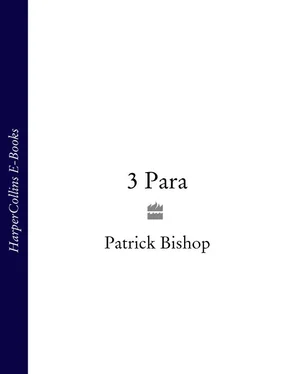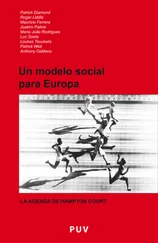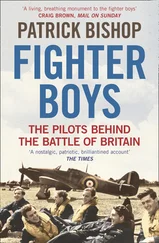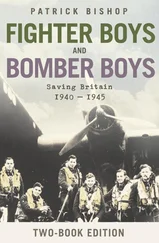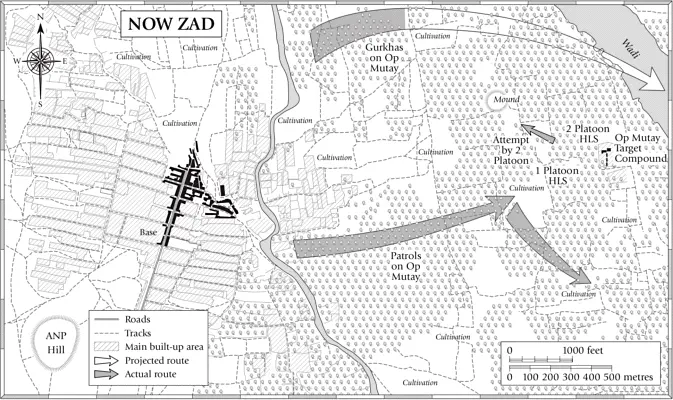
1
At about 8 a.m. on the morning of 6 September 2006 Lieutenant Colonel Stuart Tootal rolled out of his cot, pulled on his uniform and boots and set off along the duckboard walkway to catch up on overnight events.
The sun was already high and a pale, malevolent haze hovered over the talcum-powder dust of the Helmand desert. He reached a tent bristling with radio antennae and pushed aside the door flap. Inside it was warm and stuffy. The gloom was pricked with little nails of green and red light, winking from stacks of electronic consoles. It was quiet except for the occasional squawk from the radios. This was the Joint Operational Command, the ‘JOC’, where the synapses of the battle group he led came together.
Tootal was slight, wiry and driven. He was as interested in the theory of soldiering as he was in the practice, and had as many degrees as battle honours. His enthusiasm for his job was matched by his concern for his men. There would be much to be concerned about before the day was over.
The 3 Para battle group had arrived in Helmand five months earlier. Its task was to create a security zone within which development agencies could get to work on projects to develop an area barely touched by progress and lay the foundations for a future of relative prosperity.
The plan had always been aspirational. The religious warriors of the Taliban, who were struggling to reassert their power in the province, were certain to oppose the arrival of the British.
Everyone had expected some trouble, but not the relentless combat the soldiers were now immersed in. The reconstruction mission had become a memory. 3 Para and their comrades were fighting a desperate war of attrition. Most of them were besieged in bare mud-and-breeze-block government compounds – ‘platoon houses’, as they had become known – scattered over the north of the province, fighting off daily attacks from an enemy who, despite taking murderous losses, kept on coming. They spent their days pounded by the sun as they took their turn at ‘stag’, crouching in sandbagged, rooftop gun positions, or standing by to run to their posts when the shooting started. They slept on floors, washed rarely and lived off ration packs and sterilised water. They were gaunt, bony and rough looking. Their sunburned faces were fuzzed with beards, just like those of the men they were fighting.
They were on their own out there. Beyond the walls of the compound and the shattered towns lay tawny, sun-baked mountains and vast stretches of desert, ridged with dry watercourses. The mother base at Camp Bastion was far away and they were connected to it by the slimmest of links, the helicopters whose vulnerability to the insurgents’ fire made every sortie heart-stoppingly tense.
The morning started calmly. The previous day, most of the fighting had been around the base at Musa Qaleh, a broken-down fortress in the middle of a ghost town, now inhabited only by men trying to kill each other. It was held by the soldiers of Easy Company, some of whom had been there for thirty-one days. In the morning, the insurgents had lobbed five mortars into the compound from concealed positions in the maze of alleyways and walled gardens that pressed against the walls of the base.
At about 7.40 that evening some of the Royal Irish Regiment soldiers with the 3 Para battle group were on a satellite phone to their comrades at their home near Inverness, discussing the ‘big piss-up’ that was being organised to celebrate their expected homecoming in a few weeks’ time. The call was interrupted by the crash of an RPG (rocket-propelled grenade) smashing into one of the sandbagged ‘sangar’ defensive positions ringing the platoon house. The blast knocked the four men inside flat and sent a soldier flying down the stone steps, knocking him unconscious. The soldiers in the sangar struggled upright and got on their guns, scanned the ground in front of them for muzzle flashes, and poured fire into the darkness. Green and red tracer flowed back and forth, and the crack of rifles and the throb of machine guns shattered the air.
The Taliban attack was finally beaten off after forty minutes when British and American jets arrived to bomb and strafe the insurgents’ positions. Intelligence reported ‘many Taliban killed in action’. Before he grabbed some sleep, Corporal Danny Groves, one of the Royal Irish soldiers, wrote with satisfaction in his diary: ‘Today was a very good day for the boys … The Taliban had attempted to overrun us but instead they received a hell of a beating from the mismatched men of Easy Company.’
And now, another day in Helmand was dawning. At 9 a.m., Tootal’s headquarters staff gathered in the JOC for the morning brief. A few incidents had trickled in over the radio net. Just before 8 a.m., four mortars had landed in the base at Now Zad. This was the most remote of the outstations, about fifty miles to the northwest as the helicopter flew from Bastion. Half an hour later, small-arms fire and RPGs were fired at the platoon house at Sangin. This was the normal back-and-forth violence, the metronome tick of aggression and counter-aggression that punctuated every day. There was nothing to distract Tootal from his usual crowded morning of meetings and briefings.
Then, just after midday, the atmosphere in the JOC changed. Reports of casualties started filtering in from Kajaki Dam. The dam was a prize target for the insurgents. The hydroelectric station there generated power for the whole region. The British troops, who lived in sweltering trenches dug out of the stony hills overlooking it, came under regular Taliban attack. But this sounded like something different. The details were sketchy at first. A sniper on his way to spy out a Taliban position had stepped on a mine and was very badly wounded.
Tootal called up his higher headquarters at Kandahar to request a Black Hawk helicopter, equipped with a winch, to lift the casualty out. He was told there would be a long delay. A CH-47 Chinook casualty evacuation helicopter was available. But it did not have lifting gear.
On a patch of barren hillside in Kajaki, a group of men stood rooted to the ground. Beside them lay Lance Corporal Stuart Hale of 3 Para Support Company. The mine had blown off his foot. Corporal Mark Wright was on his position about a mile away when he heard the explosion. He rounded up some soldiers and medics and they ran down the hill to help. They had gone to Hale’s side knowing the potential danger they were in. Now they were trying to get him out. They began prodding the gritty sun-baked ground, clearing a path to a spot where the helicopter could get in, then carried Hale on a stretcher to the landing site. Corporal Stuart Pearson turned back along the cleared path. As he bent down to pick up a water container, there was another explosion. Until now, it had seemed that Hale might be the victim of a stray mine, probably left behind by the Russians who had spent years occupying Kajaki. Now the rescuers were hit by a grim realisation. ‘We thought, fucking hell,’ said Corporal Jay Davis, ‘we are in a minefield now. They are everywhere.’
Pearson was only four or five yards away. But every step risked another explosion. He applied a tourniquet and dosed himself with morphine while they waited for the helicopter. It arrived at 1.30, and landed more than fifty yards away across ground that for all anyone knew was thick with mines. There was no question of carrying the casualties to the Chinook. As it lifted off in a cloud of muck and grit, another mine went off, blasting shrapnel into the shoulder, chest and face of Mark Wright.
Читать дальше
